Clearer Conversations: Communication Strategies for Hearing Impairment
Apr 23, 2025
Effective communication is essential in both personal and professional settings.
For individuals with hearing impairments, clear communication can be challenging but not impossible. Here are some strategies to enhance communication and foster understanding.
Use Visual Cues
Visual aids can significantly improve communication. Use gestures, facial expressions, and body language to convey your message. Visual cues can help clarify spoken words and provide context.
Speak Clearly and Slowly
When speaking, ensure your words are clear and at a moderate pace. Avoid shouting or exaggerating your speech, as this can distort your message. Instead, maintain a natural tone and rhythm.
Face the Person
Always face the person you are communicating with. This allows them to read your lips and pick up on visual cues. Ensure your face is well-lit and unobstructed.
Minimize Background Noise
Background noise can be a significant barrier to effective communication. Try to eliminate or reduce noise by choosing a quiet location for conversations. Turn off unnecessary devices and close doors or windows if needed.
Use Technology
Leverage technology to aid communication. Devices such as hearing aids, speech-to-text apps, and video calls with captioning can bridge communication gaps. Encourage the use of these tools to facilitate smoother interactions.
Be Patient and Attentive
Patience is key when communicating with someone who has a hearing impairment. Allow extra time for responses and be attentive to their needs. If something is unclear, politely ask for clarification.
Confirm Understanding
Ensure that your message is understood by asking open-ended questions. This allows the person to express their understanding and provides an opportunity to clarify any misunderstandings.
By implementing these strategies, you can create a more inclusive and effective communication environment. Remember, the goal is to ensure that everyone feels heard and understood.
